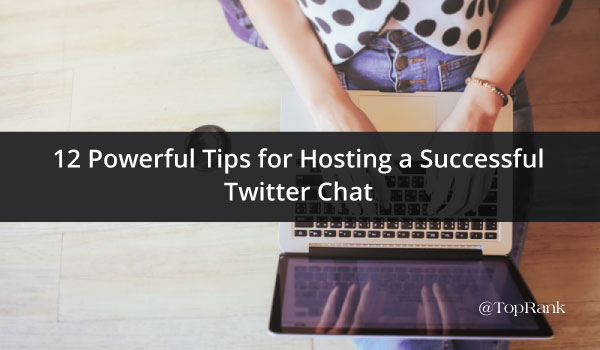
Brands are always looking for new and interesting ways to connect with their audience, build awareness and showcase what they have to offer. Over the past couple years, Twitter chats have emerged as a marketing tactic that allows brands to do just that and more.
Twitter chats are public Twitter conversations that take place surrounding a specific hashtag at a predetermined date and time. The hashtag often provides some context for the topic or theme of the chat, and allows people to easily find the conversation and participate. Most often, Twitter chats are not one-off discussions, but rather recurring events.
With Twitter boasting more than 310 million monthly active users, Twitter chats can help brands make deeper connections with their audience. How? Because Twitter chats are a great opportunity for brands to be the best answer for their audience–something that we at TopRank Marketing believe to be the foundational goal of an integrated digital marketing strategy.
Twitter chats are not meant for out-right promotion of products or services. They’re meant to inform and engage. They’re meant to provide your audience with something of value. But they can also help your brand:
- Build thought leadership and authority
- Build brand awareness
- Build relationships with influencers
- Connect and engage with customers and prospects
- Gain new followers
- Showcase relevant, helpful and useful content
If you’re considering a Twitter chat or you’re in the midst of planning one, here are a few tips and best practices that will set you up for success:
#1 – Participate in a chat before hosting your own.
The best way you can prepare yourself for hosting your own Twitter chat is to participate in a few beforehand. This is where you can get your feet wet, see moderators and participants in action, and get an idea of how quickly things can move.
To find relevant chats to attend, check out Twubs or Tweet Reports for lists and schedules of active chats.
#2 – Choose the right topic for your audience.
Choosing a topic that is relevant and cared about by your audience is essential to the success of your chat. Ask yourself: What does my audience or social community care about most? What sort of information or expertise would be the most useful to them? Get some inspiration from trending topics that your audience is talking and tweeting about.
In addition, use the aforementioned chat lists and schedules to uncover any chats that are similar to the topic you’re considering. You’ll want to make sure that you can add something new to the conversation and set your chat apart from others.
#3 – Find the right date and time.
Of course, the key to a successful chat is having people show up to participate, so picking the right date and time is important. Take a look at your Twitter analytics to see when your audience is most active on the platform. In addition, utilize those lists of chat schedules to make sure the time you’re considering doesn’t coincide with another chat on a similar subject.
#4 – Choose the right hashtag.
Selecting the right hashtag is perhaps the most important part of the planning process. The hashtag is what brings it all together. Below are a few tips:.
- Do your research to find something unique. Compile a list of 3-5 hashtags that you’re considering and use the search capabilities on all relevant social media networks to see if they’re currently in use.
- Keep it short and sweet. Remember that you’ll be using this hashtag in all the communications to promote and execute the chat. Keeping it shorter will give participants more room to say what’s on their mind and make it easier for people to remember in the future.
- Register your hashtag. While no one can legally own a hashtag, you can register your hashtag on Twubs so you can let the world know it’s part of your brand.
#5 – Choose the right moderator.
Every chat will need a moderator who is comfortable feeding questions and guiding the conversation along. You could moderate the chat yourself or bring in someone influential from your industry as a guest moderator.
Typically, moderators choose to use their own personal Twitter handles, rather than the brand’s official handle, to facilitate the discussion. This creates a more personal connection between the moderator and participants.
#6 – Invite relevant influencers and community members to participate.
Depending on the chat, influencers can be invited as featured moderators or panelists, or as general participants in the chat. Industry influencers and thought leaders add credibility, authority and value to your chat, which can help you maximize reach and engagement.
As for the others on your invite list, invite current customers or prospects to participate. This will not only help you further the relationship, but also get more insight into what’s important to them and the information they’re seeking.
#8 – Create a Chat Brief.
Your Chat Brief will serve as your outline for the entire conversation and help you organize all the moving parts. This is where you can house all the questions you’ll ask participants, how to get ahold of featured panelists, pre-written social messages to thank people for participating, and information on any relevant assets that you’ll promote during the chat. On the day of the chat, the moderator can use this outline to keep things moving.
#9 – Promote. Promote. Promote.
Promotion for your chat should be integrated with your other marketing efforts. Let people know about your upcoming chat with a blog post, share chat details on all your social channels and provide participating influencers and speakers with pre-written social messages for them to share with their followings.
In addition, use a event calendar tool such as Eventbrite to make it easy for people to add the details to their personal calendars. This will also make it easy to send reminders in the days leading up to the chat.
#10 – Get visual.
Adding a visual element to your promotional tweets as well as the Twitter chat itself can help you increase engagement. Period. In your promotional images, make sure to include the date, time, hashtag and any featured guest. This will not only give people all the necessary information, but also make it more shareable.
#11 – Consider using a tool to help you manage everything.
While using Twitter natively is certainly an option for your Twitter chat, there are several other moderation tools that could help you keep feeding questions, respond to questions and retweet great responses. A few options include:
In the end, choose the option or options that you feel most comfortable with.
#12 – When it’s over, showcase what people missed out on.
When your official chat has come to an end, you still have an opportunity to promote the awesome insights that were generated within it. Create a recap or roundup of some of the most quotable tweets in a blog post. You can also use Storify or Scoop.it to curate the entire discussion, and then embed the chat into a blog post.
Have you hosted or attended a Twitter chat? What other tips, best practices or things to avoid that you want to share? Tell us in the comments section below.


